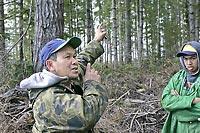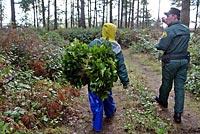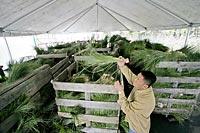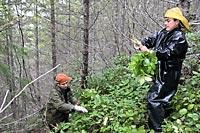A war in the woods

MATLOCK, Mason County — Son Chau and his wife were all alone and deep in the woods when a man shoved a pistol into their truck and said he was taking it all: 20,000 stems of a shrub called salal.
Chau had spent the day as he spends most, snipping woody stems with shiny oval leaves from the forest. Any other day, he would have driven the plants to Shelton to be shipped to vast open-air flower markets in the Netherlands.
But that afternoon four years ago, Chau watched helplessly as bandits loaded his day's labor into a minivan and drove off, making him another casualty in what has become a war in the woods.
Specialty products harvested from Northwest forests — including moss, salal and slender stalks called beargrass — once were a low-class sideshow to logging, picked by rural folks in need of extra bucks. It since has swelled to a mammoth industry that brings in at least a quarter-billion dollars a year — nearly one-fourth the size of the apple industry.
Along the way, simple wild greens have become such hot commodities that pickers like Chau have been beaten up, robbed and shot in fights over turf. Illicit harvesters make midnight raids to steal truckloads of greens from public and private land. Cops conduct stakeouts and sting operations in a never-ending battle against illegal picking.
Amid it all, the industry is fueled by an easily exploited workforce of immigrants who can work 10-hour days for $100 or $30 — or nothing at all. In the past two years, seven brush pickers have been killed in van crashes.
Now the state, which has battled the problems of illegal brush picking and worker safety for years, contends that nearly half the brush-picking businesses it recently audited may violate labor laws.
Yet repeated attempts to wrestle the trade under control have met stiff resistance. And some aren't sure it can be tamed.
A blooming business
Outside a cold-storage warehouse in Olympia, Sokha Kuch, president of Mr. Who Greens Corp., inspected thousands of flowing strands of beargrass that arrived in rubber-banded bunches to be packed into crates.
Every day from September to May, thousands of workers take to public and private forests all over Western Washington to pluck grass, salal and huckleberry branches for flower arrangements; cut ferns and boughs for Christmas wreaths; or collect moss for topiaries or to line fruit baskets.
It all ends up at dozens of sheds like Kuch's.
Since the 1980s, globalization and transportation improvements have allowed the brush-picking business to grow as much as 10 percent a year, drawing a stream of workers from Mexico, Guatemala and Southeast Asia.
Now local greenery is sold at Wal-Mart and Costco stores. Europeans count on a stable supply. Mr. Who Greens sends out five semi-truck-sized shipping containers a week, grossing $5 million a year. And that's just a midsize operation.
More than 250 companies in Washington are involved in picking, buying or shipping these products, the state Department of Labor and Industries counts. In 2002, the most recent year tallied, the harvest was estimated at $236 million. Up to 65 container loads are shipped domestically and overseas each week.
That's just what can be documented. An equal amount may be traded under the table, picked without permits or with forged paperwork, said James Freed, a natural-resources extension professor at Washington State University, who has observed the industry for three decades.
"Conservatively," he said, "the total take could be $500 million."
Policing poachers
Mason County sheriff's Deputy Ted Drogmund barely missed crashing his pickup into trees as he piloted up narrow logging roads to picking grounds west of Shelton on a recent spring morning.
Spying a van in a clearing, Drogmund left his truck and bounded into the woods, a palm on his holstered gun.
"Permit? You have a permit?" he shouted.
Ignacio Velazquez stumbled from the brush, but he had the proper paperwork.
Scenes like this are common for Drogmund and a handful of others in Western Washington who police illegal picking full time.
"It's still really like the Wild West out here," Drogmund said.
Some years Drogmund makes 100 arrests, for fistfights, broken windows and slashed tires. A brush picker in Mason County last month was charged with bashing his boss with a shovel.
Drogmund recently chased a van of illegal pickers who were "slow-rolling," looking for a place to bail out and scatter into the woods. Ten days earlier, an illegal picker approached Drogmund carrying a machete.
In Grays Harbor County, a picker was shot and killed in 1997 by another worker who wanted his salal patch. Another picker was shot and wounded three years ago.
Near Hood Canal, five people were caught last year stealing $28,000 in salal from private land. In Eugene, Ore., a man was sent to prison for pilfering $250,000 in beargrass. In early May, eight illegal salal pickers were arrested in the Olympic National Forest, accused of chasing off legal competitors. A few weeks ago, Forest Service patrol officers came across nearly 150 80-pound bales of moss that had been swiped from the Mount St. Helens National Volcanic Monument.
It's impossible to tabulate how much brush is stolen. In a 2004 study, Oregon State University professor Patricia Muir estimated that just the commercial sale of moss, presumed to be worth $5.5 million a year, could actually be $165 million because of poaching.
It's also hard to assess ecological damage. Salal and beargrass grow back quickly in the drippy Northwest. But moss can take years to grow, is home to hundreds of insects, and regulates water in forests.
Researchers surveyed moss on one ranger district in Oregon's Siuslaw National Forest last year and found harvesters had picked it clean.
Even with extra attention, police make little progress. Pickers rarely report crimes. Many illegal pickers work by night, burying bundled hauls and collecting them at dawn.
In 2004, police stopped a crew in a van that was so packed with stolen salal that the pickers, including a 13-year-old boy, had to be pried out. The boss told cops he had been arrested and deported to Mexico five times in five years.
"It's almost like a game," Drogmund said.
Into the woods
Before 6 a.m. on a soggy May day, dozens of men in pickups and vans rolled in and out of a gas station in Forks, Clallam County, before hitting rain-soaked forests for a day of picking.
After a ride up a logging road, two pickers, illegal immigrants from Guatemala, moved through the woods in rain gear, gathering fistfuls of salal. They sell the salal to wholesalers for 50 cents to $1 for each bunch of 25 stems. On a good day, pickers might collect 150 bunches.
"Some days are hard, when you're tired," one of the young men said through a translator. "Some days we don't find good salal."
Picking is exhausting, low-paying work. Workers are typically strong men who put in long hours for a shot at making more in a week than they would see in months back home.
They risk being ripped off, forced to work and live in filth, or even killed or maimed in van crashes.
Two years ago, when Pedro Enrique Jesus and 17 other workers were picking noble-fir boughs, the boss gave them cramped, dirty trailers to sleep in, according to state records. Jesus slept in his car but was still charged rent. After 14 straight days of work, he was paid $100.
"We're working several active cases where workers were flat not paid," said Rich Ervin, employment-standards manager for the Department of Labor and Industries.
Pickers have reported being abandoned in remote work camps for weeks at a time. In Forks, it's not unusual for pickers to spend the season sleeping 10 to a mobile home.
Drivers often ferry workers in overloaded vans. Authorities in the Olympic National Forest this month arrested a driver who had charged $20 a head to pack 17 pickers into a van with no seats.
In the spring of 2004, five workers were killed and another five hospitalized when a van crashed in Lewis County. A crash there in December 2005 killed two more workers.
Few pickers have insurance or on-the-job injury coverage.
And there's no guarantee wholesalers will always buy, "leaving workers with no way to consistently make a living," said Patricia Vazquez Gomez, with Portland's Jefferson Center for Education and Research, an immigrant-rights group.
Battles to come
Crime and mistreatment occur in part because of a simple truth: Brush-picking is largely out of sight and virtually unregulated, a system that can reward unscrupulous ingenuity.
"This is the purest form of American capitalism there is," said Freed, the WSU professor. "I met a 16-year-old who set up his own business. And he's skimming off the top."
Unlike apple or cherry pickers, who work for farms or licensed contractors that have to follow state labor laws, brush harvesters are usually treated as freelancers.
Land owners, such as timber companies, the Forest Service and the state Department of Natural Resources, charge fees for brush but often don't care who picks it. Each owner or land manager handles permitting a little differently. Only Green Diamond Resource Co., formerly Simpson Timber, requires that all harvesters work for registered labor contractors, state officials said.
Drivers or crew leaders may be illegal contractors, taking a cut of a picker's sales. Real money is made by wholesalers.
Some buy from whoever has the best price. Others get permits for picking areas, provide them to pickers, and forbid workers to sell to anyone else.
The state has tried in recent years to find ways to better protect workers. Labor and Industries has been sending bilingual auditors to the woods and buying sheds to inspect brush businesses. In 31 audits, the state found 15 businesses that should have hired pickers as employees subject to state labor rules. Seven businesses have been fined as unlicensed contractors.
But the largest buying sheds have repeatedly sued the state, arguing they aren't responsible for pickers. Resolution of the cases, while tending to lean toward the wholesalers, has only managed to keep legal wrangling alive.
Dan Fazio of the Washington State Farm Bureau, who represents the wholesalers, said shed owners buy from different people each day. Most pickers are happy with their cut, he said. And it's impossible to know when and where harvesters are picking.
Angela Schauer, who runs one of the largest sheds, Continental Wholesale Florists in Mason County, said pickers should take responsibility for themselves.
"My hope would be that sole proprietors would get educated and get the coverage they need, or accept the risks they take," she said.
Forcing sheds to employ pickers would be complicated and could increase prices, some say, driving world markets to cheaper, overseas greens. That could kill Washington's brush business, which is now an economic force in rural communities.
"That doesn't make it right," Freed said. "But that's reality."
On the other hand, workers — and, privately, some wholesalers — point out that similar arguments were made 20 years ago about regulating migrant farm labor. And that didn't kill agriculture.
"Things can change," said Sarah Loose, executive director of Portland's Jefferson Center. "It's just a question of political will."
Craig Welch: 206-464-2093 or cwelch@seattletimes.com





